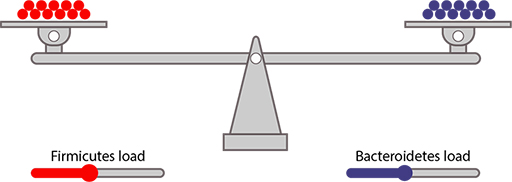1.3 Loss of balance – dysbiosis
The importance of a healthy microbiome for human health is becoming increasingly clear. A healthy microbiome needs a good diversity of microorganisms within the microbiota and a balanced ratio of the two main bacterial groups: Firmicutes and Bacteroidetes. This is shown in Figure 6, where the Firmicutes and Bacteroidetes are shown to be in balance (the actual amounts and ratio will vary between individuals).
Fun fact: What are ratios?
Ratios are a simple way of comparing two or more quantities. In the example discussed here, the ratio would be the number of Firmicutes compared to the number of Bacteroidetes. Ratios are typically expressed as numbers separated by a colon. As a simple example, if you had 3 apples and 6 pears in a fruit bowl, the ratio of apples to pears would be 3 to 6 (3:6) or simplified to 1:2.

Loss of diversity of the microorganisms within the microbiota is known as dysbiosis, and can contribute to a number of conditions affecting the gut, including irritable bowel syndrome (IBS), inflammatory bowel disease (IBD), as well as affecting other parts of the body.
-
Question 6
There are three mechanisms through which dysbiosis might occur. For example, there is a loss of overall bacterial diversity. Thinking back to what you have read earlier, select the correct word from the drop-down menu to complete the other two mechanisms.
Interactive feature not available in single page view (see it in standard view).
If there is a loss of bacterial diversity, the ratio between the bacterial groups Firmicutes and Bacteroidetes can change. But why is this important? As mentioned earlier, the microorganisms that compose the microbiome not only affect the cells of the human host, but also influence each other. That is, they have a symbiotic relationship with each other. Some of the microorganisms are known to secrete molecules that are beneficial for other microorganisms, and with dysbiosis these symbiotic relationships are disrupted.
Diet and pathogenic bacteria are both important causes of dysbiosis. Ultra-processed foods (UPFs), alcohol and foods rich in sugar or food additives can lead to dysbiosis. Bolte et al. (2022) found that processed or animal-based foods were associated with increased numbers of opportunistic pathogenic bacteria which reduced microbiota diversity. Conversely, plant-based foods, fish and fermented foods increased the number of healthy bacteria which helped to reduce the number of pathogenic bacteria.
Some of the common signs and symptoms of dysbiosis include:
- bad breath (halitosis)
- nausea
- bloating
- constipation and/or diarrhoea
- abdominal pain
- rash or redness
- fatigue and brain fog.
You will learn more about the role of dysbiosis in various health conditions in Section 4. First, you are going to learn more about some of the functions of the gut microbiome.
